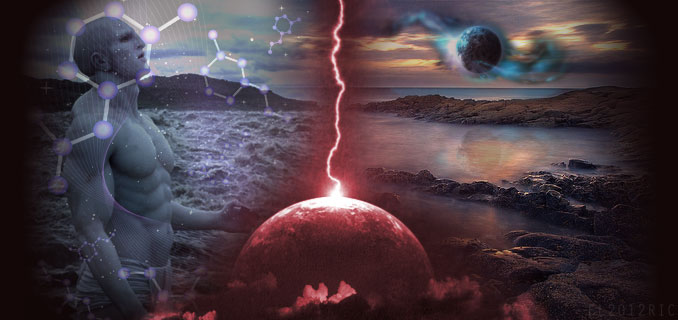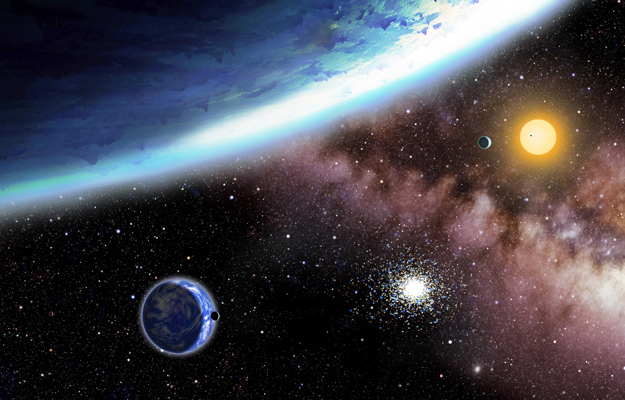The first tool use by hominids—the progenitors of modern humans—has been pushed back from 2.6 million years ago to 3.2 million years. We humans are now living in the pridefully named planet-killing Anthropocene Age. How far man has come, and how little he has changed.
 To see and say that human nature hasn’t changed since the emergence of ‘modern man’ some 100,000 years ago (a blink of an eye even in our own multi-million-year evolutionary history) is not misanthropy. Indeed, I still have faith in our potential as a species. But we have to see our species as it is, and feel the urgency of radical change.
To see and say that human nature hasn’t changed since the emergence of ‘modern man’ some 100,000 years ago (a blink of an eye even in our own multi-million-year evolutionary history) is not misanthropy. Indeed, I still have faith in our potential as a species. But we have to see our species as it is, and feel the urgency of radical change.
This question gathering momentum with scientists: Is Earth the only planet with ‘intelligent life’ that we will find in the universe? This question is gathering momentum with spiritual people: What if any significance does it have if Homo sapiens continues to destroy this beautiful planet?
The idea of human progress is deeply, if recently conditioned into our psyches. The last two hundred years of tremendous scientific discovery, and the last two decades of stupendous technological advance, make it appear that humankind is on an upward march toward ever-greater control of nature and evolution, including of our own brains.
However, more and more people are realizing that our material progress as a species is inversely proportional to our spiritual advancement. That is, the more rapacious economic growth, the less spacious inward insight; the more Homo sap destroys the diversity of life on earth, the less the possibility that we will ever be able to truly call ourselves an intelligent species.
My feeling is that thought-bearing species are rare in our galaxy and universe, but humans are not alone. More to the point, wherever life evolves creatures capable of manipulating their planetary environment, they go through the same crisis of fragmentation and consciousness that we humans are presently going through. Then they either make the transition to a genuinely intelligent species, or pass from existence.
In other words, what astrobiologists call the “Great Filter” is just ahead of us. The fat lady hasn’t sung on our species, but she’s warming up. The galactically expansionistic lunacy of commercial ventures like SpaceX, which seek to spread man’s stupidity beyond this planet, is not an option.
The greater the fragmentation of the biosphere, the greater the pressure for transmutation. We are a potentially intelligent species, whose fate is as yet undecided. And only we, the living generations, can decide it.
How can the evolutionary crisis of our species be resolved in a healthy and harmonious way? The contradiction between man and nature, indeed between man and the universe is resolved by fully awakening our capacity for insight.
Not insight for more scientific discoveries and technological advances, not insight that adds to our knowledge of the earth and the universe, but insight in itself, which redounds to understanding and the numinous.
Beyond the mind and religions of man, an essence that can rightly be called sacredness (without implying a ‘Creator’) imbues nature and the universe. The evolution of symbolic thought gives us both the potential for consciously experiencing sacredness, and is the greatest impediment to doing so. How?
Symbolic thought dominates the brain of man, and probably all creatures in which it evolves. And thought’s overwhelming tendency is to mistake its power for separation and manipulation with the essential nature of things, and thereby divide and fragment without end. The purportedly permanent self is the core product and perpetrator of this delusion and  destructiveness.
destructiveness.
I watched a creepily compelling series recently called “The Fall.” It’s ostensibly about a mass murderer of women, who’s tracked by a female detective that seems to fall in love with him. But it’s really about the human condition, and the darkness that now envelops all of us. Indeed, the show attempts to make the viewer complicit in such heinous crimes by the very act of watching the series.
The murderer is married with two young children, a boy, and a girl to whom he is devoted. His wife, who remains “stupid and incurious,” hires a 15-year-old babysitter, who falls in love with the monster, despite or rather because she knows he’s a monster.
He doesn’t have sex with the girl, but mentors her in evil. In the most important scene, he asks her: “Are you ready to embrace the darkness?”
“It’s not about sex,” he says, “it’s about deciding the essential nature of the world. Is the world a place of pain and suffering, grief and despair, or is it a place of joy and sweetness and light?”
“There’s suffering all around us, why not take some pleasure from it? If other people’s happiness pains us, why not reduce that happiness?”
The show subtly and darkly insinuates that all of us operate from this principle to one degree or another. There’s truth to that to the degree that we compare ourselves with others.
Life is not as “The Fall” portrays it however; the world is. Failing to make the distinction between what the world is and what life is makes all the difference to one’s character, and one’s life.
Darkness/evil doesn’t exist anywhere in the universe except as it is generated from the minds of creatures such as man, sentient creatures without a transformative insight into the nature of ‘higher thought.’ Thought is the root of all evil.
Thought, including its negative attributes such as tribal identification, personal conditioning and storing all experience as memory, as well as its positive attributes such as reason, scientific discovery and accretion of useful knowledge, yields to an infinitely higher principle—insight.
That is the evolutionary leap Homo sapiens can make, and it begins within the individual—you and I.
Martin LeFevre

